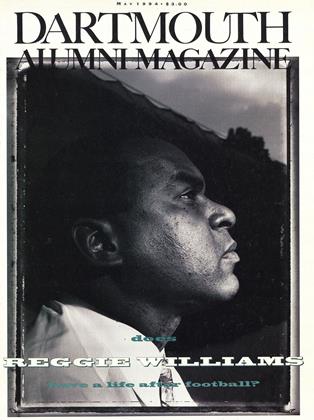It may surprise some readers to see it put this way, but in late April the Trustees made a bow to the future when they voted to keep ROTC at Dartmouth.The Board faced what it called an "unconscionable choice": discrimation against gays, or deny students a shot at ROTC and its rare scholarships open to the middle class. The Board went for option number one, keeping the program while promising to "help push the transition" to a more just government policy.
The choice was not just between fairness and scholarships but also between present and future. The Pentagon continues to refuse men and women who dare state a homosexual preference; but the trend, the Trustees implied, is in the right direction away from the active pursuit of gays and President Clinton is leading that trend. Had the Board decided to expel ROTC, the decision may well have been irreversible. The military is shrinking, not expanding into new campuses. And so the Board kept the College's options open, allowing students to join an equal-opportunity ROTC some years hence. The Board chose to favor a hopeful future over an unacceptable present.
Some of the Trustees are experienced in the ways of Washington, and they brought a worldly perspective to the issue. They understood that President Clinton got the best deal he could, and that historical momentum is on his side.
But worldliness and pragmatism are not universally popular traits in academe. One of college's great attractions is the chance to think in ideal terms and to serve as a global conscience. Opponents of ROTC are understandably unwilling to wait for the government to accept principles that seem obvious. On the Monday after the Trustees' weekend vote, a lunchtime crowd gathered outside Parkhurst to protest the decision
Still, campus feeling was far from monolithic. A poll taken last summer by this magazine of the junior class showed 60 percent in favor of keeping ROTC. The Student Assembly has similarly supported the program. The Daily Dartmouth, on the other hand, has published editorials against ROTC.
We can't help but wonder what the debate would have been like if the Trustees in die 1930s had seriously considered banning ROTC for its discrimination against AfricanAmericans. We are compelled to think back to the tail end of World War I, when a young black man just graduated from Dartmouth, Lester Granger '18, became an artillery officer. He was an exception to the rule that relegated African-Americans to support units. Years later, in 1945, a fellow eteran artilleryman, Harry S. Truman, appointed Granger head of a task force that desegregated the navy. Granger's work was a model for the other services, which rapidly created new opportunities for blacks more than a decade before people of color began appearing in significant numbers on elite college campuses.
In its decision last month, Dartmouth chose to keep its hand in the military, an organization that, like Dartmouth itself, has proven its ability to evolve.
 View Full Issue
View Full Issue
More From This Issue
-
 Cover Story
Cover StoryReggie After Football
May 1994 By Brooks Clark '78 -
 Feature
FeatureBaker Tower Nighthawks
May 1994 By Ted Levin -
 Feature
FeatureCOOL STUDIES
May 1994 By KAI SINGER 95 -
 Article
ArticleDr. Wheelock's Journal
May 1994 By "E. Wheelock" -
 Article
ArticleWhy the Novel Matters
May 1994 By Karen Endicott -
 Class Notes
Class Notes1975
May 1994 By W. Blake Winchell








